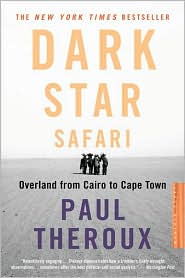 This is the first time I've read Theroux. It will not be the last.
This is the first time I've read Theroux. It will not be the last. I think the sheer audacity of the trip Theroux proposes--from Cairo to Cape Town over land--is the most attractive aspect of the book, to me. I'd love to do something that foolhardy, that crazy, but I couldn't possibly leave my wife and family and go off to do that and not feel guilty about it every single day. Theroux has been doing it for decades.
After reading, what stays with me though is not just the fact of this absurd journey, but the imagery Theroux uses. I was completely taken with his writing, his use of the language, and throughout regardless of how I felt about his commentaries on various things the writing was just wonderful.
The trip is certainly worth taking. Theroux visits parts of Africa few Westerners ever visit, and does so via means rarely if ever taken by outsiders; I was reminded of Jeffery Tayler's canoe trip down the Congo when Theroux decided to take a boat downriver from Malawi into Mozambique; who does these things? I want to talk to these people; where do they get such a crazy notion and why is there no one around to talk them out of it?
The book, perhaps the traveller himself, is strongest when he is able to be with someone strong enough to strike up an actual relationship, however brief. In Ethiopia, Uganda, Malawi, and elsewhere Theroux spends several days with one person or a group of people and it is here that we get the best insight into Africans themselves; other conversations with former political prisoners--Theroux notes that a great many men of a certain age in Africa have been in prison, often for a fairly long time, a comment I'd heard in Djibouti but never considered--are equally illuminating. Theroux by himself tends to fall into a Brysonesque tendency to pick on people, though in fairness in Egypt he's picking on people who probably deserve it.
The book has received some press coverage and commentary for Theroux's strong comments about the international aid effort in Africa. Some of his complaints are petty and I think personal--he consistently complains that aid workers in their shiny new Land Rovers never stop to pick him up when he's looking for a ride; yet at the same time he knows full well how dangerous the areas he's going through are, and why should an aid worker believe his story and give him a ride when there are no doubt dozens of Africans who'd like the same favor? Theroux never considers that or, if he does, he doesn't write about it. Seems petty and I was a little annoyed with it by the sixth or seventh time he complained about it.
Theroux's main argument about aid is that the Aid For Africa industry--and it is an industry--has done nothing to improve the lives of everyday Africans, employs no Africans, involves no Africans in its decision-making, and works almost entirely to further the goals of other nations and the careers of the aid agencies themselves. Some of those criticisms are certainly fair, not the least of which is that all the millions or billions of dollars spent in Africa by aid agencies over the years has led to precisely zero improvement in the lives of Africans; things are indeed worse than ever. And a lot of aid programs are tied to requirements from the home country--the project must use a certain contractor or purchase materials from certain places, instead of everything being done in Africa by African suppliers and companies. Part of the reason there's no corporate infrastructure in Africa to speak of is that most government budgets are aid, and most aid requires projects to use international contractors, so local contractors can't even get work from their own governments and thus cannot build local wealth.
But a lot of aid work is done by Africans, and there is a glaring problem with Theroux's anti-aid bias: he never talks to an aid agency. He talks to a couple of Catholic nuns, and a handful of teachers, but not to anyone in a leadership capacity; indeed, he'd rather sneer at the people driving the Land Rovers than try to engage them, although in fairness they don't seem interested in engaging him.
There are people more learned than I about the topic who have criticized Theroux's statements, and I'll let you look those up if you're interested; a good bit of the criticism seems to be picking nits, though, and most impartial observers are coming to agree that there is something fundamentally wrong with the international aid is handled in Africa. Whether he's right in all the details, Theroux's complaints about aid are not unique and certainly should be food for thought.
Controversy aside, the book is a wonderful read, and there's just not anything else out there like it. Travel writing about Africa tends to be either limited in scope or of poor quality in general; this book is certainly neither of those. Now if there was just something of this quality about west Africa...
No comments:
Post a Comment